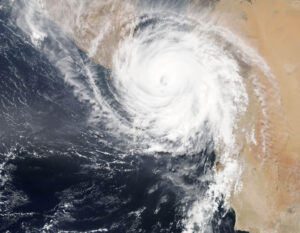In the wake of devastating natural disasters across the United States, we are reminded of the importance equipping individuals with accurate and timely information. From Hurricane Harvey, to the fires in the Northwest, to Hurricane Irma, we have experienced an avalanche of destruction across the nation.

Power outages, destroyed homes, lost belongings, displaced families, and interrupted or heightened work schedules are just some of the side effects from these massive catastrophes.
According to Dr. Jim Dennison, a commentator reporting from Florida made the perceptive statement, “The worst in Mother Nature often brings out the best in human nature.” I believe we are seeing this happen. For we Christians, in the midst of chaos, we have a hope that outlasts any storm or disaster. We know that we are equipped with a sound mind, not a spirit of fear (2 Timothy 1:7). And we know that as the hands of feet of Christ, we have the responsibility to help others (1 Corinthians 12:12-26). In times of darkness, we have the greatest opportunity to share the light of Christ.
It’s important to know what to do in the midst-of and after these crises, regardless of your circumstance, so we have created a checklist of steps to follow.
Give them a quick update on your location, condition, well-being, and needs. Try to plan for a way they can get in touch with you over the next few days (social media can be helpful if you have access).
Seek their prayers and be honest about your needs. This is no time to be shy, so be honest and willing to accept help. Try to learn the needs of others who are affected as well so you can serve as you are being served. Work together to use your gifts and talents to support, serve, and comfort one another.
If you are missing a family member after a disaster, this website can be helpful.
FEMA (Federal Emergency Management Agency) is a government agency that supports citizens and first responders during emergencies. You can find up-to-date resources and information on their website. If you’ll be in need of financial assistance outside private insurance coverage, you’ll likely need to file a claim.
Notify your primary insurer(s) and ask to learn more about your coverage. Find out what assistance is available, and inform them of your circumstance. DON’T FORGET to take pictures of any damage you or your property sustains during the disaster.
If you are directly impacted by these storms and their repercussions, now may be time to follow a Crisis Budget for the short-term and focus on the essentials while you regroup.
Many times in crisis, people make poor decisions based on fear or panic. Pray, stay calm, and focus on the basic necessities. Remember Psalm 24:1 – “The earth is the Lord’s, and everything in it, the world, and all who live in it…”
Employers will often work on plans to offer assistance or make provisions for their employees affected by the disaster. Make your needs known and ask your employer to work with you as you’re getting your life back to normal. Be in constant contact as you are able.
If you are self-employed or run your own business, communicate with your key customers and staff. Let them know you’re making plans to take care of accounts and return things back to normal.
Once you have information from relief organizations and your insurance company, you need to make a plan for your future.
Crown’s online MoneyLife Personal Finance Study can help you, your family, or your church get on the right track after a crisis. The study is self-paced and made up of 7 lessons that cover all areas of your finances from a biblical perspective. It can be your first step towards rebuilding your life and finances.
If your income is interrupted, you may want to consider a part-time job to help you through the crisis. You could consider companies like Uber, Lyft, or Upwork. It’s likely there will be many job opportunities to clean up and rebuild in the areas affected by the disaster, so you may consider hiring out your services as a contractor with TaskRabbit or Handy.
Disasters and crises can be frightening and emotional. Remember that Job lost his business, servants, assets, children, and health all at the same time.
Cast your cares upon the Lord. He cares for you. No matter how much sorrow or grief you may be experiencing, remember our God is the God of all Hope. He will be with you in the storms ahead. Don’t lose faith.
Subscribe for Weekly Updates
"*" indicates required fields
Search
Christian Credit Counselors

Is credit card debt causing you stress and strain? Christian Credit Counselors would like to help!